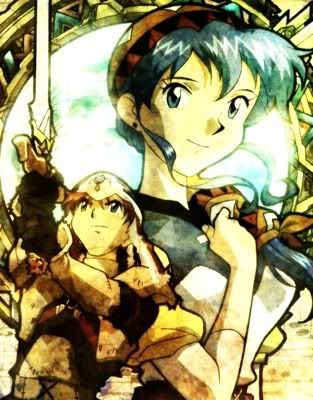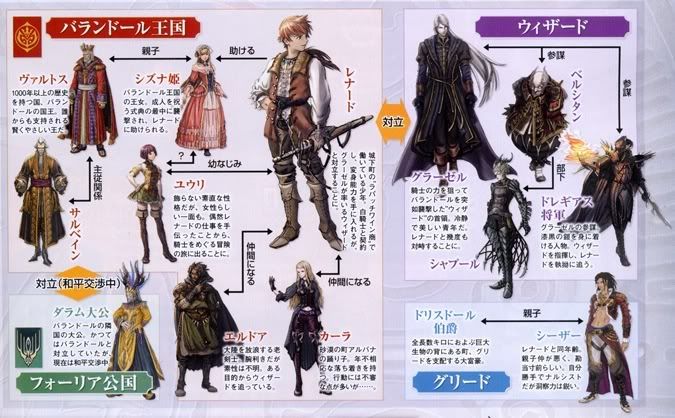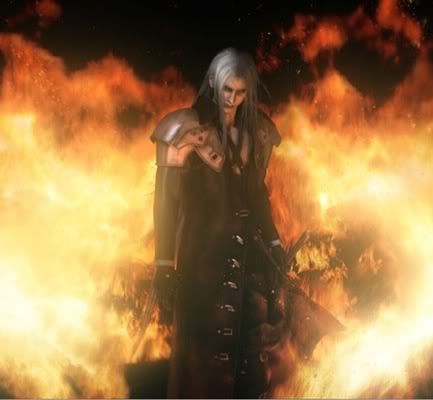RPG Clichés: Stock Characters
 Alex and Luna from Game Arts' Lunar: Silver Star Story are classic examples of traditional characters.
Alex and Luna from Game Arts' Lunar: Silver Star Story are classic examples of traditional characters.
For anyone who is familiar with the genre, traditional/console RPGs, or role-playing video games are infamous for their trademark gameplay aspects and unspoken “rules” or clichés that many of the games follow. Planned as a recurring column, I hope to provide background information for those unfamiliar with the genre and give some insight and commentary on their role in the RPG genre as a whole. My first entry covered random encounters and this week’s entry will go over stock or archetypal characters.
Console RPGs tend to follow a general outline that comes from its roots in tabletop games. They use these stock characters because they are easily recognizable by the consumers and are classic depictions of the traditional storyline. One of the most used is the small-town hero/protagonist. He usually dreams of exploring the world, leaving behind his humble beginnings in favor of adventure. Classic examples include such games as Lunar, Arc the Lad, and even the famed Final Fantasy VII to a certain extent. The hero is often brash and adventurous, getting into trouble as he gradually discovers the larger plot and a greater evil. Depending on the setting and gameplay, he traditionally wields a sword and shield, as well as some sort of magic or special skill. Another personality utilized is the strong, silent type that allows the player to choose branching dialogue and mold their personality as they see fit. I think this classic hero character is so often used not only because it’s timeless, but also because it allows you to see and experience adventures through the eyes of a young dreamer. Seeing him make a name for himself as he and his party explore the world is a satisfying feeling no matter how many times it is done. While the repetition of the character in many games can wear thin, it’s hard to be too critical. Like many archetypes, it’s done so well that it’s hard to criticize. However, game developers sometimes use this as a crutch instead of coming up with new and unique character ideas. As voice acting and storylines become more immersive, it’s a must to do something unique and different instead of the same old thing. Upcoming PS3 exclusive White Knight Chronicles is being developed by Level-5 and looks to feature similar archetypal characters.
Upcoming PS3 exclusive White Knight Chronicles is being developed by Level-5 and looks to feature similar archetypal characters.
The next stock character often goes hand-in-hand with the classic hero. The female childhood friend/love interest/healer/priest is rarely seen without the small-town hero and helps facilitate necessary gameplay and story elements. She is the one that keeps the hero in-check and provides the magical assistance in battle to complement his physical aptitude. She also ends up being one of the first people to join your party as you meet new people along your travels. As your group fights to finish off the great evil, she also serves as the romantic side story with an occasional rival love interest added in. She is used so often because she fits well with the hero and she serves so many different needs for the game. While both archetypes serve as outlines for the character personalities, each game often adds their own touch that makes them different from other games. When done right, they can be interesting characters that offer a nice subplot for the main story. Much like fantasy or romance novels, you come with certain expectations and wait to see how well the creator executes their ideas. The good games make their characters stand out more than their archetypes, while others follow too closely and make them seem shallow and one-dimensional. Square Enix has created memorable villains such as Final Fantasy VII's Sephiroth.
Square Enix has created memorable villains such as Final Fantasy VII's Sephiroth.
The villains also get their fair share of stock characters. The Final Fantasy series popularized the long-haired, pretty villains with guys like Sephiroth from FFVII taking center stage. While they all come in different forms, their motive usually doesn’t extend farther than taking over the world. What makes each one unique is their personality and charm. It’s important to have an antagonist that has good chemistry with the protagonist and one you can really love to despise. Another popular example is Kefka from FFVI. Serving as the Emperor’s court mage, his strong personality and classic evil laugh keeps him as one of the more memorable villains. As with the protagonists, the important thing is personality and execution.
An important part to any RPG are the NPCs, or non-player characters. They make each town feel alive instead of just a row of shops and houses. They usually follow a certain path or stand in a specific spot, offering insights that flesh out the universe or aid in puzzles, plot points, or gameplay advice. Since they are mostly not significant to the plot and are usually background characters, essential story information isn’t usually given to them unless specifically stated. Many gamers avoid talking to NPCs, preferring to progress further through the game rather than read non-essential text. You will typically see the gossiping women, children playing, and the townspeople complaining about the oppressive evil. I actually enjoy talking to the NPCs, so it’s fun to see what they have to say and how they can add to the experience. But when they have a lot to say, it can become more of a chore. Some can underestimate their importance, as they are critical to making the world more three-dimensional rather than just a series of battles strung together.
I don’t really see stock characters as a bad thing, as long as they are done in fun and unique ways. But as developers rely on them more, you start to appreciate the ones that do something new and different. While console RPG fans may be more forgiving, it’s easy to see how this may be a turn-off to others. This could also lead into the big story vs. gameplay debate, but that’s for another time. Since story remains an important of the game, the characters should show some uniqueness that make them stand out from their archetypal roots.

